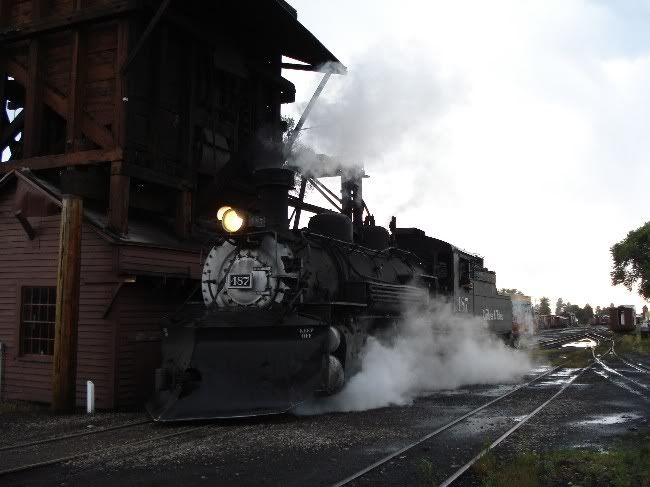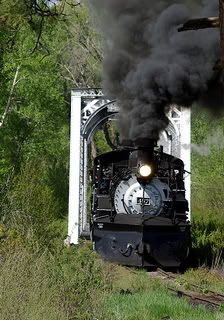It has been said, "The West has to be seen to be believed. But it has to be believed to be seen." -- Kiowa poet N. Scott Momaday. The same could be said about the Cumbres & Toltec.
America's most authentic steam-operated railroad, the Cumbres & Toltec is a proud remnant of the spirit that won the West. In recognition for its place in our national history it was awarded National Historic Landmark Designation in 2013.
Built in 1880, it was part of the San Juan Extension of the Denver & Rio Grande Railroad, with tracks running from Denver through the ore-rich Rocky Mountains to Silverton, Colorado and Santa Fe, New Mexico. Its path through steep passes and deep gorges is the stuff of adventure novels and was an engineering feat for the time. The decline of silver mining in the 1890s ended the railroad's vital role.
The Denver & Rio Grande Railroad filed for abandoment in 1969, but the most scenic part of its route, its equipment, and its buildings were saved by the states of Colorado and New Mexico.
Today the Cumbres & Toltec Scenic Railroad fulfills another important mission - taking passengers on the ride of a lifetime, connecting Colorado and New Mexico, the Mountains of the San Juans to the Conejos Valley, and allowing us to see where the deer and the antelope play.
Formal Rio Grande, Cumbres and Toltec Locomotive 487
 |
 |
|
The 480 series or K-36 locomotives were ten
engines designed for the D&RGW. They were built by the Baldwin
Locomotive Works in Philadelphia, Pennsylvania in 1925. The 480's were
the last ten narrow gauge locomotives constructed in the United States.
The 480s were used for freight-hauling throughout the D&RGW narrow
gauge network.
The Cumbres and Toltec owns four K-36s: 483,
484, 487,
and 488
and 489.
Engines 480, 481, 482, and 486 are owned by the
Durango and Silverton Narrow Gauge Railroad. 485, unfortunately,
fell into the turntable pit in Salida, Colorado in 1955. It was
scrapped for parts thereafter.
The K 36's were used primarily as freight
locomotives out of Alamosa to Durango, Colorado and to Farmington, New
Mexico. They were built with special valves to allow brake control
between locomotives while doubleheading, and were commonly found
between Alamosa and Chama, New Mexico. They were heavily used during
the pipe boom in Farmington, New Mexico, and hauled long freight trains
between Alamosa and Farmington, returning with natural gas and other
goods.
Great video. That s some beautiful country. My brother has ridden on those narrow gauge trains a couple of times in the rockys. Said it was a great trip.
ReplyDeleteThose locomotives look bigger than the narrow gauge Baldwins in North Carolina and they are both 3 ft narrow gauge.
Terry
Fla.
That part of the country is lovely - would have loved to ride that train, too! Hard to believe they are only 3 feet!
Delete